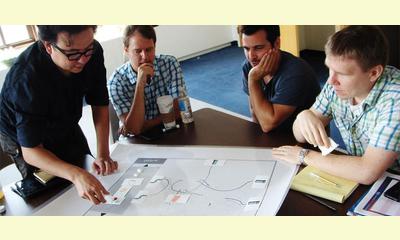|
|
The 3rd UN Alliance of Civilizations Summer School
un articulo por UNAOC (abridged)
On Saturday the 4th of August the 3rd UN Alliance of Civilizations Summer School started. The week-long seminar have gathered an eclectic mix of approximately 135 participants aged between 18 and 35 years in the city of Coimbra, home to the most ancient University in Portugal.

click on photo to enlarge
The group is geographically and culturally diverse representing 69 different countries from around the world. We have ensured gender balance, so half of the group are young women while the and other half are young men. Participants represent a wide array of interests, organizations, and affiliations. Some of them are students, representatives or members of youth organizations engaged in community, social, civic or political action. We have also some participants who work for their governments. They all are key multipliers, playing active roles within youth organizations, networks or services at the local, national or regional levels. They have significant experience in international youth work and project work. The pedagogical team includes members with dynamic professional backgrounds: scholars, experts, policy-makers, civil servants, facilitators, trainers. The whole team comprises more than 20 people.
The objectives of the Alliance Summer School are to:
* Promote the empowerment of youth by strengthening intercultural skills and competence
* Strengthen young people’s capacity to get involved in the preparation and implementation of cooperative action across divides
* Facilitate moments of encounter and exchange between young people and
* Develop a network of participants in the Alliance summer schools
During the week-long course, we are focusing on mutual learning, using the participants’ experiences as the starting point of the training-learning process. Active participation and in-depth reflection are key methodologies used in the course. Participants are comparing their approaches to youth work in our increasingly diverse societies and serve as agents of change while engaging in the preparation of concrete projects to be carried out once back home. Even before the school started, all kinds of ideas were already popping up on our Facebook page and chat rooms. Here is a glimpse of what our participants were talking about:
From Hungary: ‘We are working on our project here. It is called “EuroArab Project”. Please, let me know if you are interested in it. We will be soon recruiting more Europeans and Arabs to our core team.
From Australia: ‘I’ll be coming over from Melbourne Australia. I represent an organization called YGAP which inspires and enables social entrepreneurs to end poverty. Looking forward to the conference!!’
From Tunisia: ‘Dear All, I am from Tunisia, a graduate student working to promote Human Rights in Tunisia and Women Rights more specifically. I am really glad to be part of this amazing team and I can’t wait to meet all of you soon in Lisbon.’
From Brazil: ‘I am a student of International Relations…. and I love to understand other cultures! I also like to be involved in Human Rights, Global Governance, Youth Empowerment and so on. I am a volunteer at the YMCA Sao Paulo and I had a speech in one of our programs (Youth Leadership Development) about Citizenship and Culture of Peace . . .
Follow UNAoC on Facebook and stay tuned for more updates!
|








|
DISCUSSION
Pregunta(s) relacionada(s) al artículo :
Is there a renewed movement of solidarity by the new generation?,
* * * * *
Comentario más reciente:
from Javier Collado Ruano, Director of Edition at Global Education Magazine, on the occasion of the International Day of Solidarity.
Solidarity is a trans-dimensional phenomenon that goes beyond the ontological essence of human nature. In fact, when we analyze the connections between the microcosm and the macrocosm, we perceive that human beings are not involved in chaos and arbitrariness, but belongs to the large network of interdependencies, complementarities and reciprocities that constitute life. The emergence of life on Earth, around 3,8 billion years ago, was a complex process of exceptional natural phenomena, inherent in all living systems. A process which is expressed through unlimited creativity: mutation, gene exchange, and symbiosis. From a cosmo-biological perspective, we can understand a new conceptual dimension of life, where all living beings share same basis of genetic code: the twenty amino-acids and four phosphatic bases. In fact, the diversity of living beings is caused by the combination of this cosmo-bio-genetic basis.
This trans-dimensional perspective has a deep ecological and spiritual sense for our worldview because the human evolutionary adventure is the latest stage of life on Earth. The modern human being is a vertebrate animal, mammal, belonging to the primates, which emerged 200,000 years ago. In recent centuries he has imposed its anthropocentric, industrial and capitalist vision to the detriment of Pachamama (and Indigenous goddess known as earth mother). We consume around 120% of the natural resources that Earth Mother regenerats annually. Our consumer behavior is immersed in a fatalistic dynamic with a destiny to climate change (deforestation, loss of biodiversity, ozone, etc.), and our own self-destruction as a species.
There is an urgent need to get beyond the cognitive fallacy that the mental structures of social Darwinism and capitalist postulates of the 19th century have historically constituted, because they only understand natural and social systems as warmongers and competitive processes whereby species diverge from each other. . ... continuación.

|
|









